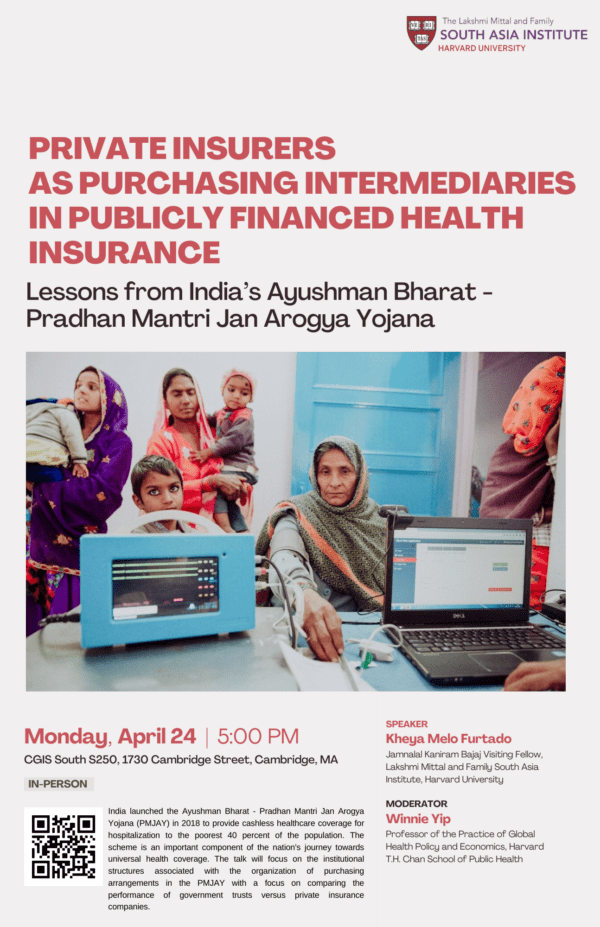India launched the Ayushman Bharat – Pradhan Mantri Jan Arogya Yojana (PMJAY) in 2018 to provide cashless healthcare coverage for hospitalization to the poorest 40 percent of the population. The scheme forms an important component of the country’s journey towards universal health coverage. In this presentation, the institutional structures associated with the organization of purchasing arrangements in the PMJAY will be examined, with a focus on comparing the performance of government trusts versus private insurance companies. The governance arrangements that underly this performance will be delineated to invite discussion around the potential future role of government and the market in purchasing care in the world’s largest government- funded insurance program.
Speaker: Kheya Melo Furtado, PhD
Mittal Institute Bajaj Fellow, Spring 2023
Kheya has been working as Faculty of the Healthcare Management programme at the Goa Institute of Management, India since 2018. Her areas of research, consultancy and teaching are Health Systems Financing and Public Health. She has secured research projects as Principal Investigator from the World Health Organization (WHO) and the Harvard School of Public Health. Her current research focusses on policy and implementation assessments of India’s national publicly financed insurance scheme, the Ayushman Bharat- Pradhan Mantri Jan Arogya Yojana, as well as other state- level health protection schemes in India. She is interested in the issues of mixed health systems, particularly in the role of the private sector in achieving health system goals.
Prior to GIM, she served at the Health Division of the NITI Aayog, the policy think-tank of the Government of India, New Delhi, where she implemented key projects such as the NITI Health Index for ranking States & UTs on their performance in Health; the drafting of the Health Chapter of the Three- Year Action Agenda for Government of India 2017-18 to 2019-20 and the NITI District hospital index for monitoring the performance of public hospitals. She also contributed policy inputs on key national health schemes and initiatives.
Her doctoral research was carried out on the role of private sector engagement and participation in disease surveillance, under the INSPIRE Fellowship award of the Department of Science and Technology, Government of India.
Moderator: Winnie Yip
Professor of the Practice of Global Health Policy and Economics in the Department of Global Health and Population at the Harvard T.H. Chan School of Public Health
Dr. Yip holds a PhD in Economics from the Massachusetts Institute of Technology. Her research focuses on rigorous and policy-relevant health system evaluations and the design and testing of innovative health system interventions to improve equitable access to efficient and good quality health care. In particular, she integrates economics, organization theory, management, and political economy to examine the use of national and state-level policy levers—including financing, provider payment, strategic purchasing, governance, and regulation—to leverage delivery system change. She currently applies this approach to developing viable and effective models of population health based integrated delivery systems in China and India. She is also interested in the implications of China’s ageing population for the country’s health system and in designing and piloting innovative eldercare systems to support older adults in living meaningful lives.

